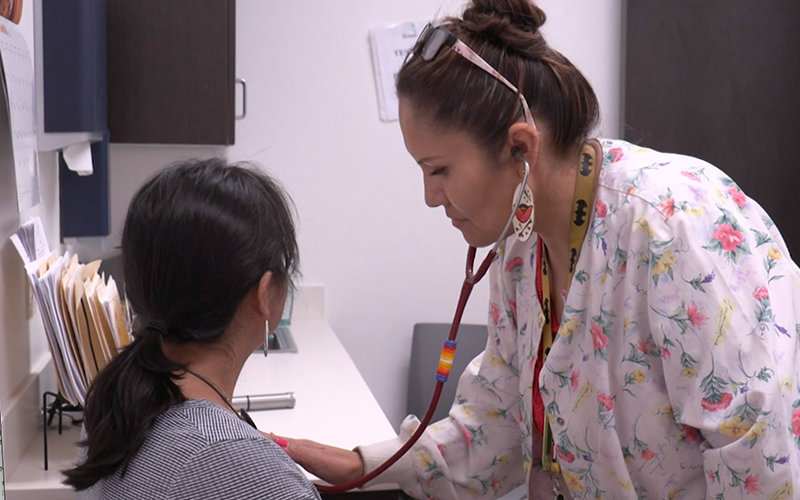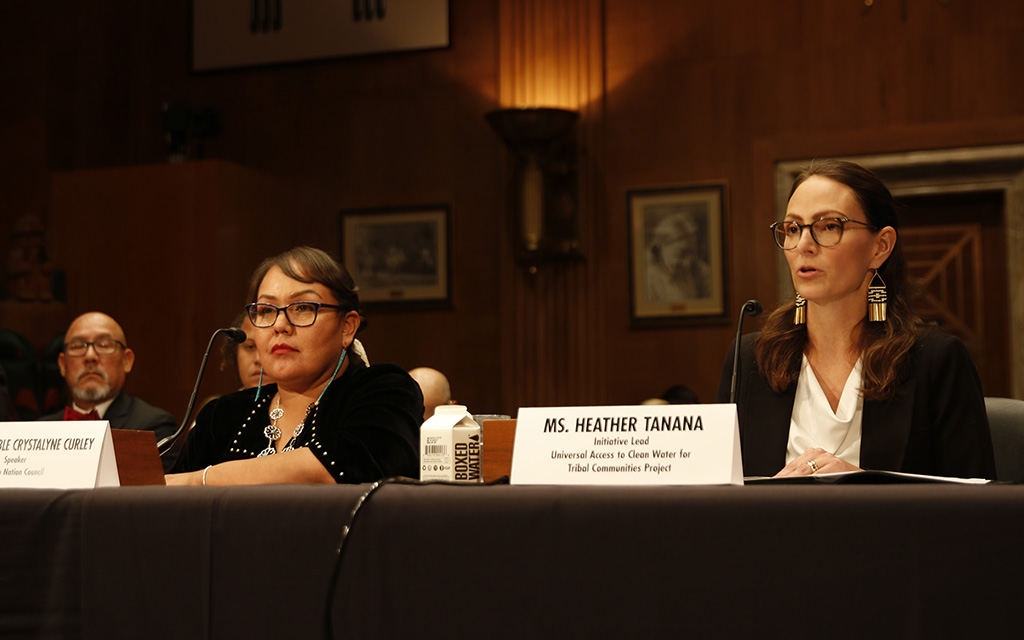
The Supreme Court agreed to hear a case from the San Carlos Apache and the Northern Arapaho Tribe over claims that the Indian Health Service is shortchanging them on health care reimbursements. In this 2019 photo, Nurse Diana Weaselboy checks a patient at Patina Wellness Center in Phoenix, part of Native American Connections. (File photo by Ricky Cornish/Cronkite News)
WASHINGTON – The Supreme Court said Monday it will consider a claim by the San Carlos Apache tribe that the federal government is shortchanging it on funds it needs to operate tribal health services.
The case turns on whether the Indian Health Service should reimburse the tribe’s overhead costs for health services it delivers with the support of third-party insurers, like Medicaid or private insurance. In the case of the San Carlos Apache, that amounted to $3 million in overhead expenses over a three-year period, according to court documents.
The IHS claims it already pays tribes an administrative fee to offer health services. Requiring it to pay overhead for services paid for by a third party would be a “sweeping” expansion of its obligations that would cut the budget for health care for “some of the most underserved tribal communities in the country.”
When asked for comment, IHS said it does not comment on pending litigation. But an attorney for the tribe called the case “another effort by IHS to penalize tribal governments trying to maximize quality health care for their communities with extremely limited resources.”
“On two prior occasions the Supreme Court has rejected government efforts to restrict contract support cost payments to tribes operating self-determination contracts (Cherokee Nation and Ramah Navajo),” Lloyd Miller, the attorney, said in a text message Monday.
The San Carlos Apache is one of two tribes, along with the Northern Arapaho Tribe of Wyoming, suing IHS over the agency’s obligations under the Indian Self-Determination and Education Assistance Act. Among other things, the act allowed tribes to take over operation of health services that had been provided by IHS.
In exchange, the IHS paid the tribes the cost of care it would otherwise have been providing, as well as a “contract support costs” fee to cover tribes’ administrative costs.
The law also allows tribes to bill third-party insurers and keep the payments, as long as the money goes back into tribal health care. But a lower court noted that “there is a hole” in that plan, since tribes are stuck with the additional cost of processing the third-party payment.
“When Tribes operate the enlarged program, they incur increased overhead expenses, such as increased auditing and financial management costs,” the San Carlos Apache said in their appeal to the Supreme Court. “If the government refuses to reimburse these overhead expenses, Tribes must divert program income away from (health care) services.”
Both parties agree that IHS is woefully underfunded, leading to “‘persistent health disparities’ in American Indian communities.” According to documents in the case, IHS spends $4,078 per capita, compared to $8,109 for Medicaid and $13,185 for Medicare.
But IHS claims that forcing it to pay for third-party overhead would make things worse by saddling the agency with additional costs estimated between $800 million and $2 billion a year.
Appeals courts in the 9th and 10th judicial circuits sided with the San Carlos Apache and the Northern Arapaho Tribe, respectively. IHS appealed to the Supreme Court, saying that if those rulings are allowed to stand, tribes that collect third-party payments “would be able to significantly expand their IHS funding” while noncontracting tribes “would likely face reduced programs or services.”
The tribes agreed with IHS that the Supreme Court should hear the case and settle the issue, but that it should uphold the circuit courts’ decisions.
“The Tribe’s request for reimbursement of contract support costs is not a cash grab, as the government implies,” the San Carlos Apache filing says. “Rather, it is the Tribe’s attempt to obtain the funding it needs and deserves under the statutes to start closing the healthcare gap.”


